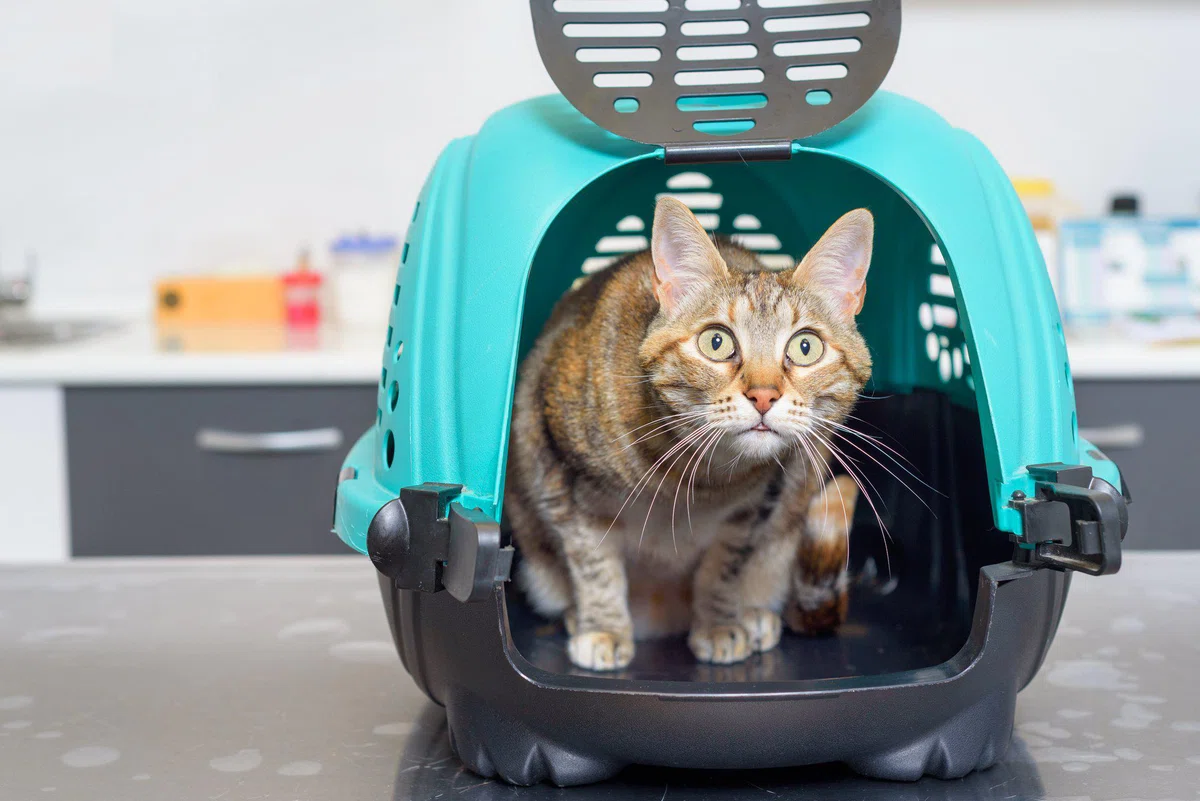
Procedure and safety of animals' stay. High-quality care and comfort during the owner's absence.
We understand the procedure and safety of zoo hotels: quality accommodation, care for pets in the absence of owners. Find out more.
Content
- Procedure and safety of pet hotels: animal care and legal aspects
- Quality of service in pet hotels: what makes them safe and comfortable
- Pleasant features and variety of pet hotels
- Caring approach to the pet's stay in a pet hotel
- Selection to a pet hotel: conditions of acceptance and reasons for refusal
- Returning home: how to accept a pet from a pet hotel
- Frequently asked questions
- 🏨 Where can I go if I need to temporarily transfer care of my pet while I'm away?
- 📅 How can I prepare in advance for a temporary transfer of care of an animal?
- How can I choose a suitable place for my dog to live temporarily?
When it comes time to travel or go on business trips, pet owners often face a dilemma: who can they trust to take care of their pet while they are away? Leaving your pet in the care of trusted relatives or friends is not always possible, because they may also have their own circumstances. In addition, not all pets can easily tolerate changes in the environment.
However, do not despair, because there are several proven ways to leave your pet while you are away, to be sure that it will be in caring hands and will receive the necessary attention and care. In this article, we will consider various options for transferring care of animals during a trip, evaluate their advantages and disadvantages, and also give advice on choosing the most suitable option for your pet.
The first and, perhaps, the most obvious option is to contact professional boarding houses or salons for animals. These are establishments specializing in temporary care for pets, providing all the necessary services: from feeding and walking to medical care. Such establishments usually have experienced workers and comfortable living conditions for animals. However, this option can be quite expensive and is not always suitable for animals that suffer from stress from a change of location.
Another option is to find private guardians for your pet. These can be people who will temporarily take the animal into their home and provide care and attention to it in your absence. To do this, you should turn to friends, recommendations, or use specialized platforms for finding temporary guardians.
There are also non-profit organizations and volunteers ready to help with looking after animals while you are away and even temporarily place them in shelters. This option is suitable for those who want to be sure that their pet is in caring hands, and at the same time help homeless animals.
Regardless of the chosen option, before handing over care of the animal, it is worth holding a preliminary meeting with the guardians, finding out about the living and care conditions, and also discussing all the details and features of caring for your pet. It is important that the transfer of care is as comfortable and safe as possible for your pet, and for you - peace of mind and confidence that he is in good hands.
Procedure and safety of pet hotels: animal care and legal aspects
Pet hotels provide pet boarding services during the absence of their owners. The process begins with a call to the hotel, where the dates of stay and conditions are discussed. The animal can be brought independently or picked up from the owner's place of residence. Payment for accommodation is made in advance. During the stay at the hotel, many establishments provide owners with photo and video reports, and some even allow you to watch your pet via online broadcast.
- Legislation and safety. It is important to note that in accordance with the current legislation, an animal is property, and the contract with the pet hotel is concluded on the terms of storage. Therefore, when choosing a hotel, you should make sure that it is legally registered as an individual entrepreneur or LLC. This will provide animal owners with protection and the possibility of compensation in the event of disputes or problems due to the fault of the hotel.
- Vaccinations and living conditions. A good pet hotel requires vaccinations, treatment for parasites and a veterinary passport for all guests. This is a precaution that guarantees protection from possible infections and diseases. It is important to choose establishments that provide separate spacious enclosures for each animal, ensuring comfort and safety during their stay.
- Home boarding: risks and safety. In addition to zoo hotels, there are so-called "home boarding". However, by turning to them, animal owners take on certain risks, since these services are often provided by volunteers without concluding official contracts. This may entail uncontrolled conditions of detention and the absence of vaccination checks for other guests. When choosing a home boarding, you should be especially careful and make sure of the reliability and experience of the owners.
Quality of service in pet hotels: what makes them safe and comfortable
Professionalism and care. The safety and comfort of animals in pet hotels depend on the level of professionalism and care of the staff. Often, such establishments are opened by experienced dog handlers, veterinarians and kennel owners who know how to handle animals to create the most comfortable conditions for them.
Ideal location. A good pet hotel should be located in a separate building with equipped enclosures and a walking area for animals. The hotel territory should be fenced with a high fence, and it is desirable that it is located outside the city or in an industrial area, away from residential buildings. This will ensure isolation from strangers and minimize possible troubles with neighbors.
Useful services. High-quality pet hotels offer useful additional services, such as daily photo and video reports on animals, as well as the ability to broadcast online to the owner's smartphone. This makes it possible to monitor the pet and maintain contact throughout the stay.
Conditions of maintenance. Animals should be kept in spacious enclosures or "rooms" that allow them to move freely. The premises should be well lit, clean and equipped with ventilation. No visual contact between animals will reduce stress levels and ensure the safety of all residents.
Nice Features and Variety of Pet Hotels
- Glass enclosures with houses. Some pet hotels offer enclosures with transparent glass walls. This is convenient for maintenance and cleaning, but caring owners will always provide secluded places, such as houses, so that animals can hide from prying eyes.
- Individual approach. Quality hotels strive to provide an individual approach to each guest. This may include providing special diets and medications, as well as taking into account the individual characteristics and needs of each pet.
- Educational programs. Some pet hotels offer interesting educational programs for animals. This may include training, intellectual games, and other activities that contribute to the development of the pet and maintain its activity.
- Socialization. Some hotels provide socialization of animals, allowing them to interact with other guests. This is especially important for dogs and social cats, who can find a common language and enjoy each other's company.
A caring approach to your pet's stay at a pet hotel
Before booking a room at a pet hotel, it is worth organizing a "tour" visit for your pet so that it can get acquainted with the living conditions. This will help it adapt to a new place more easily. Agree on the time of the visit in advance, and do not forget to book a room in advance to be sure of the availability of places.
Before checking in, the pet hotel staff will definitely ask you about your pet's habits and feeding habits. It is important to provide detailed information about the walking schedule, feeding, favorite games and possible diseases so that your pet feels comfortable and safe.
If your pet eats dry or wet food, do not forget to bring enough for the duration of your stay at the hotel. In the case of natural food, clarify the possibility of preparing food according to your recipe. This will help to avoid stress and digestive problems.
Be sure to indicate which veterinarian you are contacting and provide his contact information. Although the pet hotel usually has its own veterinarian, having a specialist who is familiar with your pet will give you additional confidence.
The most difficult period for a pet is adaptation. It may refuse food, feel lethargic and stressed in the first days. To make this period easier, take its bed and bowls with you so that they smell like home. For cats, it is also important to bring a litter box with the usual filler.
Pet hotels accept not only dogs and cats, but also other animals, such as ferrets, rabbits, rodents and parrots. Each animal is kept in its own cage or enclosure, ensuring their safety and comfort.
The contract with the pet hotel must specify all the details and conditions of your pet's stay, as well as the actions of the hotel in the event that it is impossible to contact you. It is important to establish who can take the animal and make decisions on your behalf.
Selection for a pet hotel: conditions for acceptance and reasons for refusal
Pet hotels are caring institutions that provide accommodation services for various pets. However, not all animals are suitable for living in such places. It is important to comply with certain conditions so that your pet is accepted into a pet hotel.
Here are the main reasons why a pet may be refused:
- Failure to comply with vaccinations: Your pet must be vaccinated, and the date of the last vaccination must be current.
- Not treated for parasites: Infestation with parasites can pose a threat to other animals living there, so treatment must be timely.
- Signs of infectious diseases: Any disease that can be contagious to other pets becomes a reason for refusal.
- Heat in a bitch: The presence of a bitch during heat can cause stress and anxiety in other animals.
- Skin diseases: If your pet has skin problems, this may be grounds for refusal.
- Excessive Aggression: Aggressive behavior may pose a danger to other animals and hotel staff.
Returning Home: How to Adopt a Pet from a Pet Hotel
Your pet's stay at a pet hotel has come to an end and is now returning home. The process of returning your pet also requires attention and care to ensure a smooth transition from the hotel back to your home environment.
Before accepting your pet from a pet hotel, there are several important things to consider:
- Check their condition: Examine your pet for injuries or other physical problems. Pay attention to their behavior and mood to make sure they were doing well during their stay at the hotel.
- Review photo and video reports: If you were provided with photo or video materials about your pet's stay, review them to see how they spent their time at the hotel.
- Verbal report: Be sure to get information from the pet hotel staff about your pet's behavior and condition during their stay.
Once home, create a calm environment for them and give them time to adjust. Your pet may be stressed after being separated from you and in an unfamiliar environment, so help them cope with this period.
Pay attention to their diet and walking schedule, return their usual toys and accessories. Gradually restore the usual routine so that your pet feels more confident.
Regardless of the reasons for your pet's stay at a pet hotel, such establishments provide reliable and caring services for pets. By placing your pet in a pet hotel, you can be sure that it will receive the necessary care and attention, which will allow you to calmly enjoy your time off or solve everyday problems, knowing that your pet is safe and comfortable.
Frequently asked questions
🏨 Where can I go if I need to temporarily transfer care of my animal while I'm away?
You can contact specialized pet hotels, boarding houses for animals, or use the services of professional guardians.
📅 How can I prepare in advance for the temporary transfer of care of an animal?
Book a place for your pet in advance, clarify the requirements for vaccinations and parasite treatment. Provide information about its routine, diet, and health characteristics.
🐕 How do I choose a suitable place for my dog to live temporarily?
When choosing a place, pay attention to the reputation, living conditions, availability of walks, and attention to each pet. Be sure to conduct a preliminary tour.






27 comments
Log in to leave a comment